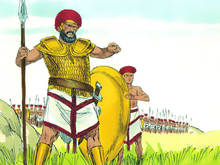Armour-bearers
By Mark Morgan | David

The Bible mentions armour-bearers several times. Their job title gives the impression that all they did was carry armour, but that’s a long way from the truth.
We are never given a full job description for an armour-bearer in the Bible. As far as we can tell, they were special bodyguards for important people such as kings, princes or commanders.
November is NaNoWriMo month – for the 20th time. I’ve only begun lately: this is my third year of manuscripting madly. I can assure you that, while it isn’t easy, it is worthwhile.
In 2017, I wrote the first draft of the story that became “Joseph, Rachel’s son”, published a little more than a year after I began. Last year it was a story about Daniel which I called “Daniel – Man of light”. This story is still in progress (see the “Other” tab on Bible Tales Work in Progress for more information and progress). One reason for this is the recurring feedback that “Joseph, Rachel’s son” is too short: the book on Daniel will be longer (God willing).
This year (2019) I decided to write the first draft of another Biblical novel. The title is “The King’s Armour-bearer”. [Update: The book is now available for purchase.] I’ll get to who the king is, but first let’s go through what the Bible tells us about armour-bearers.
The most famous person who was an armour-bearer at one stage of his career was King David. For a time – and we don’t know how long – he was King Saul’s armour-bearer,[1] but it seems that he quickly moved on to bigger and better things. He held important positions such as the captain of the king’s bodyguard[2] and commander of 1,000 soldiers.[3] Later, of course, he became king, first over the tribe of Judah[4] and finally over all Israel.[5] Being an armour-bearer required courage and David had shown great courage (and faith) in fighting Goliath the giant.
David’s best friend, Jonathan the son of King Saul, had an armour-bearer who once climbed a cliff with him to attack a Philistine garrison when everyone else was hiding.[6] On that occasion, we are told that when they reached the top, Jonathan led the attack and his armour-bearer followed, killing fallen soldiers after him. Just two against an army, but they won – with timely help from God through an earthquake that terrified the Philistines. Once again, courage (and faith) was essential. This incident is the background for the micro-tale “Up we go”, included in “Fiction Favours the Facts – Book 2”.
In the army of King David were some famous mighty men. Their list of accomplishments is staggering, from their chief – who killed 800 men at one time[7] – to Benaiah the warrior priest who had the distinction of killing a lion in a pit on a snowy day.[8] Yet we don’t even hear what deeds made most of David’s mighty men stand out, except that one of them was an armour-bearer for Joab, the commander of the army.[9]
Interestingly, he was not the only one who carried armour or a shield for Joab. When Absalom rebelled against King David, we are told that he was surrounded and killed by 10 of Joab’s armour-bearers as he hung in an oak tree.[10]
I suppose these were more like bodyguards than merely carriers of armour – you don’t want a commander to have to concentrate on fighting when the army needs direction.
Clearly, armour-bearers were not just ordinary soldiers; they had to be outstanding fighters.
On two occasions, however, armour-bearers were ordered to do something unexpected: kill their master. Since this is exactly the opposite of what they normally did, it’s no surprise that one refused to obey!
The first incident involved a man called Abimelech, a son of Gideon, the famous judge of Israel. When he and his army were attacking a tower, a woman dropped a millstone on his head from the tower. Abimelech decided that he was dying and wanted to avoid the infamy of being killed by a woman, so he called on his armour-bearer to kill him, which he promptly did.[11] Amusingly, when Abimelech is referred to later, it is to point out that he was killed by a woman, so his attempt to redirect the blame failed dismally.[12]
The other armour-bearer who was asked to kill his master was King Saul’s armour-bearer.[13] Saul had been badly wounded in battle by the Philistines and was worried that they would mistreat him, so he ordered his armour-bearer to kill him. The armour-bearer refused to do so and Saul had to do the job himself by falling on his sword. When the armour-bearer saw that Saul was dead, he killed himself in the same way.
As for the king referred to in the title “The King’s Armour-bearer”, the answer is: King Jehoshaphat of Judah. Do you know where to find him in the Bible?
See also:
Armor-bearers on Bible Hub
Notes
| ↑1 | 1 Samuel 16:21 |
|---|---|
| ↑2 | 1 Samuel 22:14 |
| ↑3 | 1 Samuel 18:13-14 |
| ↑4 | 2 Samuel 2:4, 10-11 |
| ↑5 | 2 Samuel 5:3; 1 Chronicles 11:3; 12:38 |
| ↑6 | 1 Samuel 14:6-15 |
| ↑7 | 2 Samuel 23:8 |
| ↑8 | 2 Samuel 23:20-23 |
| ↑9 | 2 Samuel 23:37; 1 Chronicles 11:39 |
| ↑10 | 2 Samuel 18:15 |
| ↑11 | Judges 9:53-54 |
| ↑12 | 2 Samuel 11:21 |
| ↑13 | 1 Samuel 31:3-5 |